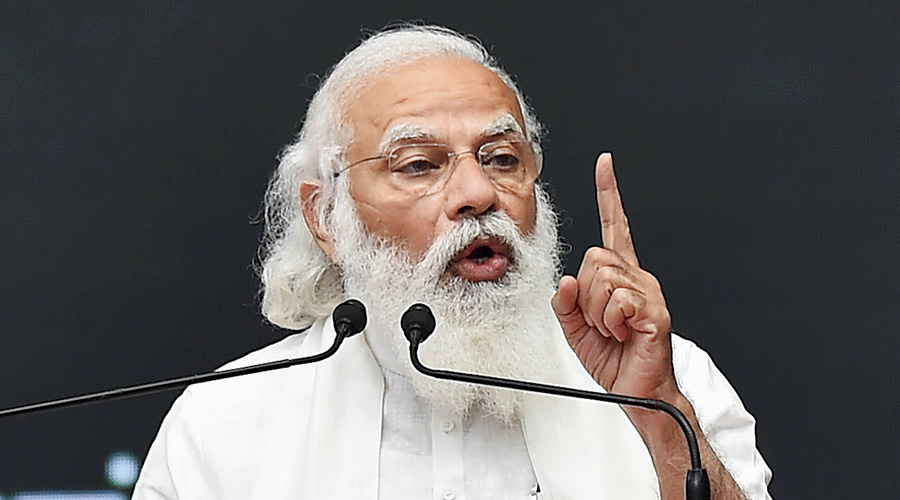Prime Minister Narendra Modi has resorted to a familiar diversionary tactic of blaming the UPA regime for the dramatic flare up in petrol and diesel prices — cresting above Rs 100 a litre in several parts of the country — while trying to hide his government’s colossal failure in handling a burning issue that could ignite inflation just when it seemed it had been yanked under control.
Modi said the middle-class would not have been burdened if the previous governments had focussed on reducing India’s energy import dependence.
“Can we be so import dependent? I don’t want to criticise anyone but I want to say (that) had we focussed on this subject earlier, our middle-class would not have been burdened,” he said at a function to inaugurate oil and gas projects in poll-bound Tamil Nadu.
The NDA government has failed to put forward a credible plan to reduce import dependence since domestic production of oil and gas meets only about 18 per cent of the country’s energy demand. Data show that demand for crude oil in India reached 4.9 million barrels per day (bpd) compared with less than 1 million bpd of the total domestic liquids production.
Without referring to the relentless increase in retail fuel prices, which are linked to international rates, Modi said India imported over 85 per cent of its oil needs in the 2019-20 financial year and nearly 53 per cent of its gas requirement.
Petrol and diesel prices have been breaking records almost daily even as Assembly polls loom in four states, including Bengal. Assam, which will also go to the polls with Bengal, has reduced the state levy on petrol and diesel and so have Mizoram and Rajasthan, where petrol crossed the Rs 100-per-litre-mark on Wednesday.
Opposition parties, including the Congress, have criticised the price hikes, blaming it on the Modi government for raising taxes to scoop out the benefit that arose from international oil rates plunging to a two-decade low in April-May last year.
While global rates have rebounded with a pick-up in demand, the government has not restored the taxes, which are at a record high.
Central and state taxes make up for 60 per cent of the retail selling price of petrol and over 54 per cent of diesel.
Petroleum minister Dharmendra Pradhan has recently ruled out the possibility of the government intervening by cutting duties and providing some relief to consumers.
Since coming to power in May 2014, the Modi government has periodically raised the excise duty on petrol and diesel even when the global crude price plunged to $18-per-barrel levels in April last year.
While the duty was Rs 9.48 per litre of petrol and Rs 3.56 per litre of diesel in May 2014, it has increased to Rs 32.90 a litre of petrol and Rs 31.80 for diesel.
Taxes make up for over 61 per cent of retail petrol price while they constitute more than 56 per cent of diesel rates.
Pradhan on Wednesday urged Saudi Arabia and other global oil producers to ease production cuts, saying rising international oil prices are hurting economic recovery and demand.
Demand recovery should take “primacy” over oil prices at least for the next few months, he said.










